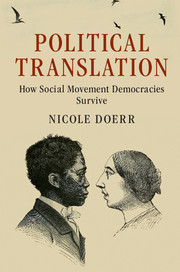Book contents
- Political Translation
- Cambridge Studies in Contentious Politics
- Political Translation
- Copyright page
- Contents
- Tables
- Acknowledgments
- Introduction Addressing Differences and Inequality within Deliberation
- 1 Paris
- 2 Frankfurt versus Atlanta
- 3 Santa Brigida, California
- 4 Santa Brigida Revisited
- Conclusion A New Model for Deliberation
- References
- Index
- Books in the Series (continued from p. ii)
- References
References
Published online by Cambridge University Press: 15 February 2018
- Political Translation
- Cambridge Studies in Contentious Politics
- Political Translation
- Copyright page
- Contents
- Tables
- Acknowledgments
- Introduction Addressing Differences and Inequality within Deliberation
- 1 Paris
- 2 Frankfurt versus Atlanta
- 3 Santa Brigida, California
- 4 Santa Brigida Revisited
- Conclusion A New Model for Deliberation
- References
- Index
- Books in the Series (continued from p. ii)
- References
- Type
- Chapter
- Information
- Political TranslationHow Social Movement Democracies Survive, pp. 136 - 146Publisher: Cambridge University PressPrint publication year: 2018



